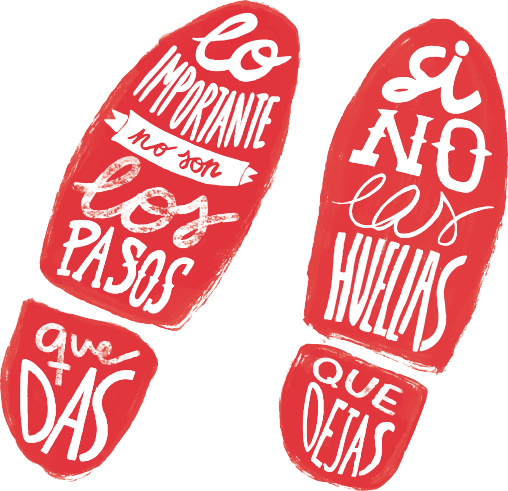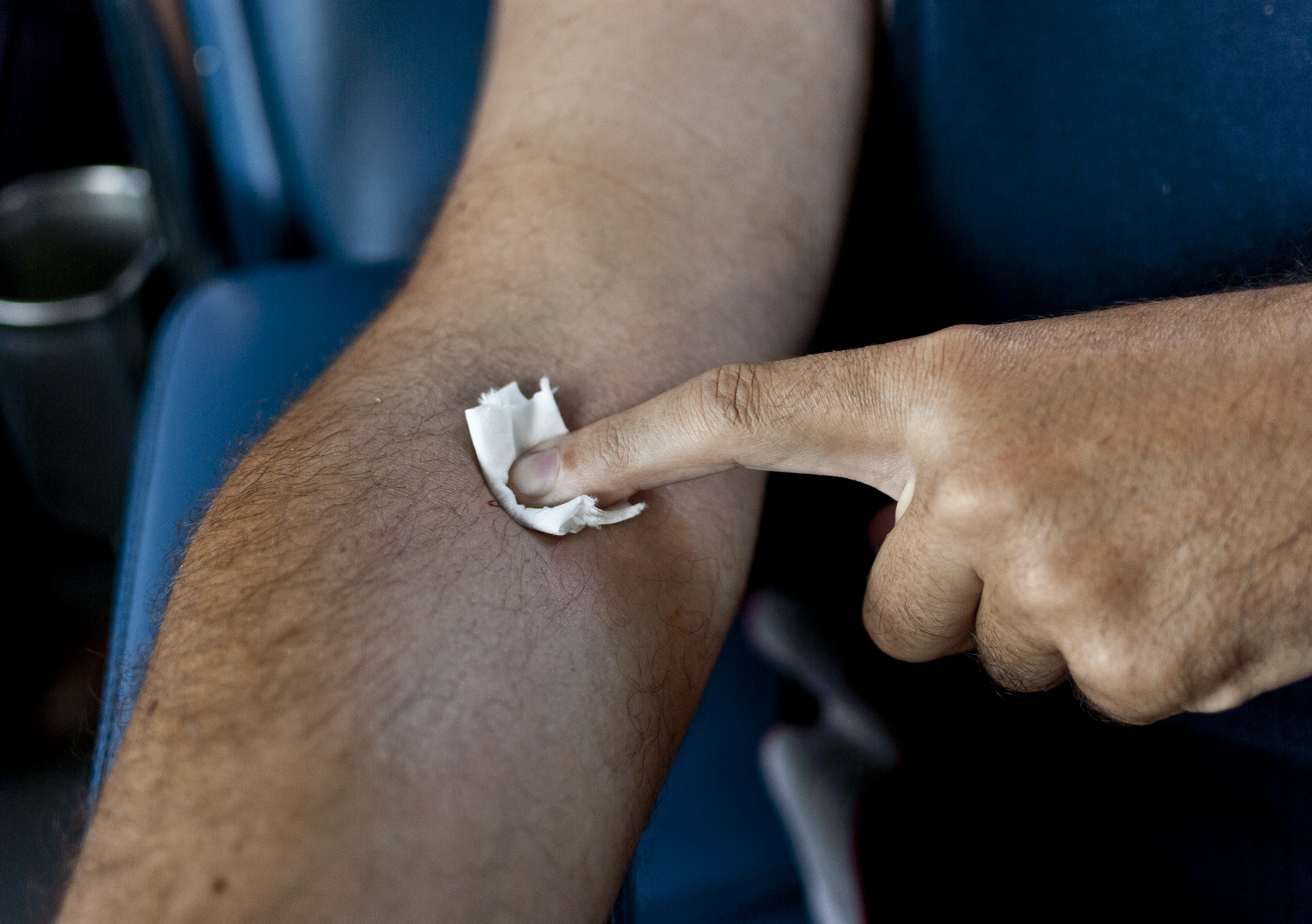
Donación de sangre
Si no hay donación, no hay transfusión. Las donaciones de sangre son imprescindibles diariamente para la realización de múltiples tratamientos e intervenciones.
La sangre no se fabrica. Si nunca has donado, puedes empezar hoy.
En la Comunidad de Madrid se pueden transfundir cada año cerca de 38.000 unidades de sangre en cirugías, 42.000 a pacientes onco-hematológicos, 40.000 en Medicina Interna (para reponer sangre perdida en hemorragias digestivas, úlceras sangrantes, diálisis etc.), más de 30.000 en Urgencias ó 9.000 en intervenciones dirigidas a niños, entre los miles de componentes sanguíneos que se transfunden.
Niveles de reservas de sangre
En esta imagen, puedes ver el estado actual de cada grupo sanguíneo:
- En color verde: estado óptimo, no se necesitan donaciones extra pero si las habituales de cada día (900 en total de todos los grupos).
- En color amarillo: necesitamos donaciones extra en dos o tres días de esos grupos.
- En color rojo: necesitamos donaciones extra de urgencia.
¡¡¡TE ESPERAMOS!!! ¡¡GRACIAS POR DONAR!!
- En un recambio de cadera se pueden consumir entre 2 y 3 donaciones de sangre.
- En una cirugía de columna hasta 4 o 6 donaciones.
- En un trasplante multiorgánico pediátrico, en torno a 24 donaciones.
- En un parto complicado, entre 2 y 4 o incluso hasta 10 si hay una hemorragia masiva.
- En un trasplante de hígado, entre 30 y 200 donaciones.
- En un tratamiento de leucemia: hasta 250 donaciones.
- En una intervención quirúrgica: hasta 20 donaciones.
Si vas a donar: sigue las huellas
Si encuentras estas huellas al entrar en tu hospital, síguelas. Te llevarán hasta la sala de donación. Allí te esperamos.
Deja tu también una huella solidaria. Dona sangre.
Puntos de donación
El Centro de Transfusión de la Comunidad de Madrid coordina una amplia red de puntos de donación, fijos y móviles, con el fin de acercar y facilitar la donación de sangre.

Horario de atención al público:
- De lunes a sábado (excepto festivos): de 8:30 a 21:30 h.
- Domingos y festivos: de 8:30 a 14:00 horas
Medios de transporte:
- Autobuses: 71, 130, 8 y E4.
- Metro: Valdebernardo (Línea 9).
Aparcamiento gratuito:
- Para facilitar el acceso a los puntos de donación, tanto el Centro de Transfusión como los hospitales de la región facilitan aparcamiento gratuito para los donantes.
Puntos de donación móviles, fijos y centros colaboradores:
A continuación, puedes consultar la información sobre los puntos de donación de sangre disponibles:
- Unidad móvil en C/Gran Vía esquina C/ Montera: lunes a viernes de 11 a 20:45 h, y sábados y domingos de 10 a 20:45 h.
- Unidad móvil en C/ Fuencarral, 120: consultar días y horarios en "puntos móviles por fecha y municipio".
- Unidad de Extracción de Sangre de Cruz Roja: sala de donación, c/ Juan Montalvo, nº 3. De lunes a viernes. De 9 a 20:30 h. (excepto festivos).
Botón puntos móviles
Dona Sangre con Regularidad
Campaña de Maratones de donación de sangre
El Centro de Transfusión da inicio a los maratones de donación de sangre en su segunda convocatoria del presente año. Estos maratones están programados desde octubre de 2025 hasta el mes de enero de 2026, periodo en el que se celebran unas colectas especiales en cada uno de los hospitales madrileños con el objetivo de garantizar los niveles de reservas de sangre. Gracias a esta iniciativa, que el Centro organiza en dos ediciones anuales, se pueden obtener entre 9.000 y 10.000 bolsas de sangre adicionales cada año.
Los maratones se celebran durante uno o dos días y están diseñados para captar la atención de las personas sanas que visitan los hospitales, ya sea por consultas, acompañamientos, visitas o por ser vecinos y parte de la comunidad de estos centros sanitarios. También son una excelente oportunidad para que los propios profesionales de la salud participen en la donación.
En esta edición, el Centro de Transfusión llevará a cabo un Macromaratón de Sangre y Plasma que celebrará durante los días 23, 24 y 25 de octubre en la Real Casa de Correos ubicada en la Puerta del Sol de Madrid.
Para poder participar en esta donación especial de plasma, es necesario pedir cita en el teléfono: 913017240.
Si no puedes acudir a este maratón o no te es posible participar durante estas fechas en tu hospital más próximo, ¡no te preocupes!, puedes hacerlo cualquier día del año. ¡Te necesitamos siempre!
El proceso de donación de sangre
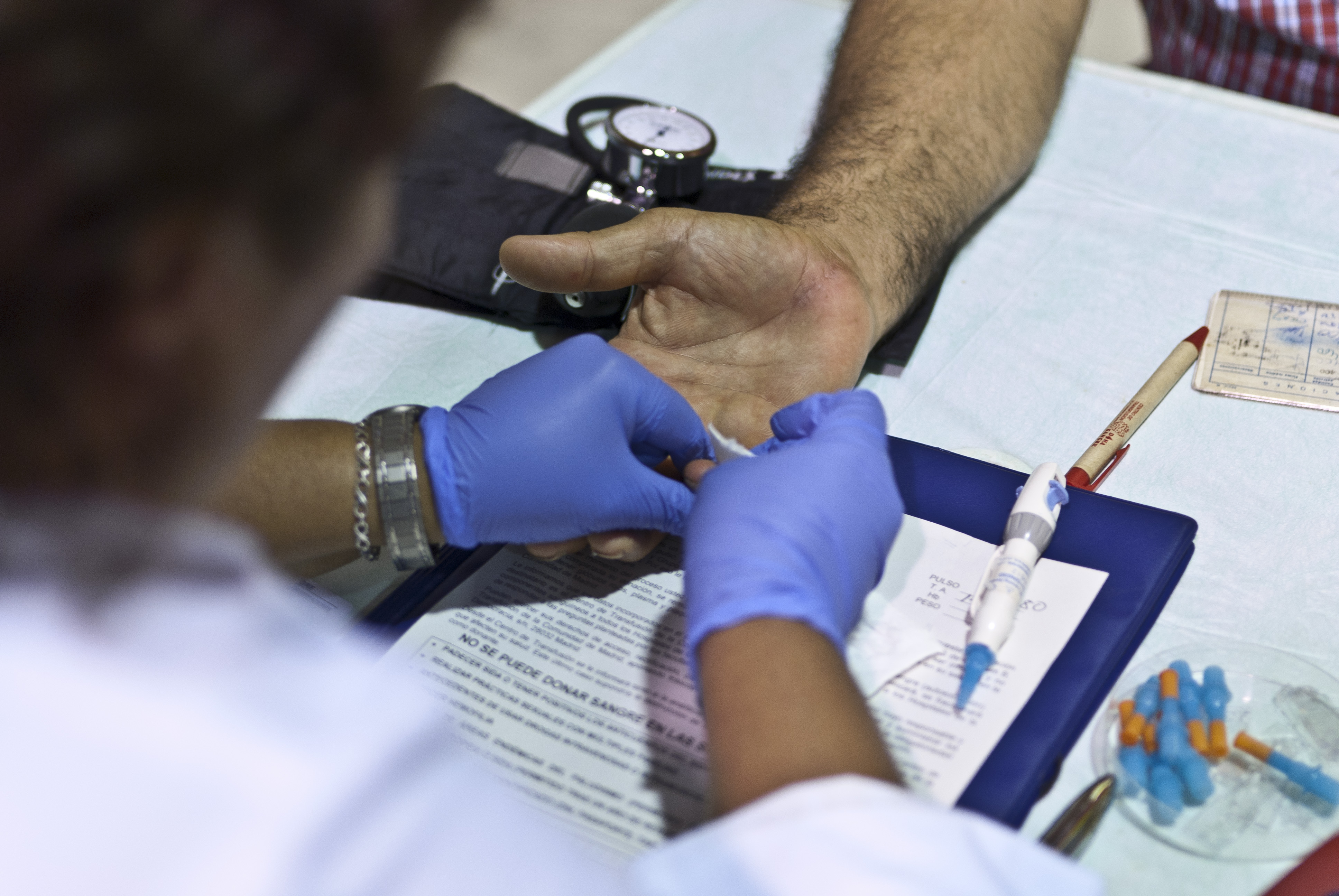
- No estar en ayunas.
- No haber consumido alcohol.
- Completar un cuestionario con datos de filiación y preguntas de salud:
- Te harán algunas preguntas sobre tu historia médica, estado de salud y estilo de vida actuales. Estas preguntas tienen como único objeto salvaguardar tu propia salud y la de la persona que reciba tu sangre.
- Es importante ser sincero: indicar si existe algún motivo que te haga suponer que tu sangre podría no ser apropiada.
- Te informarán si estás en condiciones de donar sangre y, en caso negativo, si podrías ser donante en el futuro.
- Cualquier información personal que te soliciten será tratada de manera confidencial y no podrá ser utilizada para ninguno otro fin.
- Te harán un breve examen médico, que incluye: el control del pulso, la tensión arterial, el nivel de hemoglobina y el peso.
Tu salud es muy importante para el servicio de transfusión sanguínea y no se te hará una extracción de sangre si no existe la plena seguridad de que estás en condiciones de hacer una donación ese día.
- Ponte en una posición lo más cómoda posible: habitualmente en una silla especial o sobre una camilla.
- En primer lugar se te limpiará la región del pliegue en la parte interna de uno de los brazos con una solución antiséptica. Un enfermero te insertará una aguja estéril en su vena, conectada a una bolsa para recoger la sangre.
- La bolsa de donación se llena en unos 10 minutos. El proceso dura en total una media de 20 minutos.
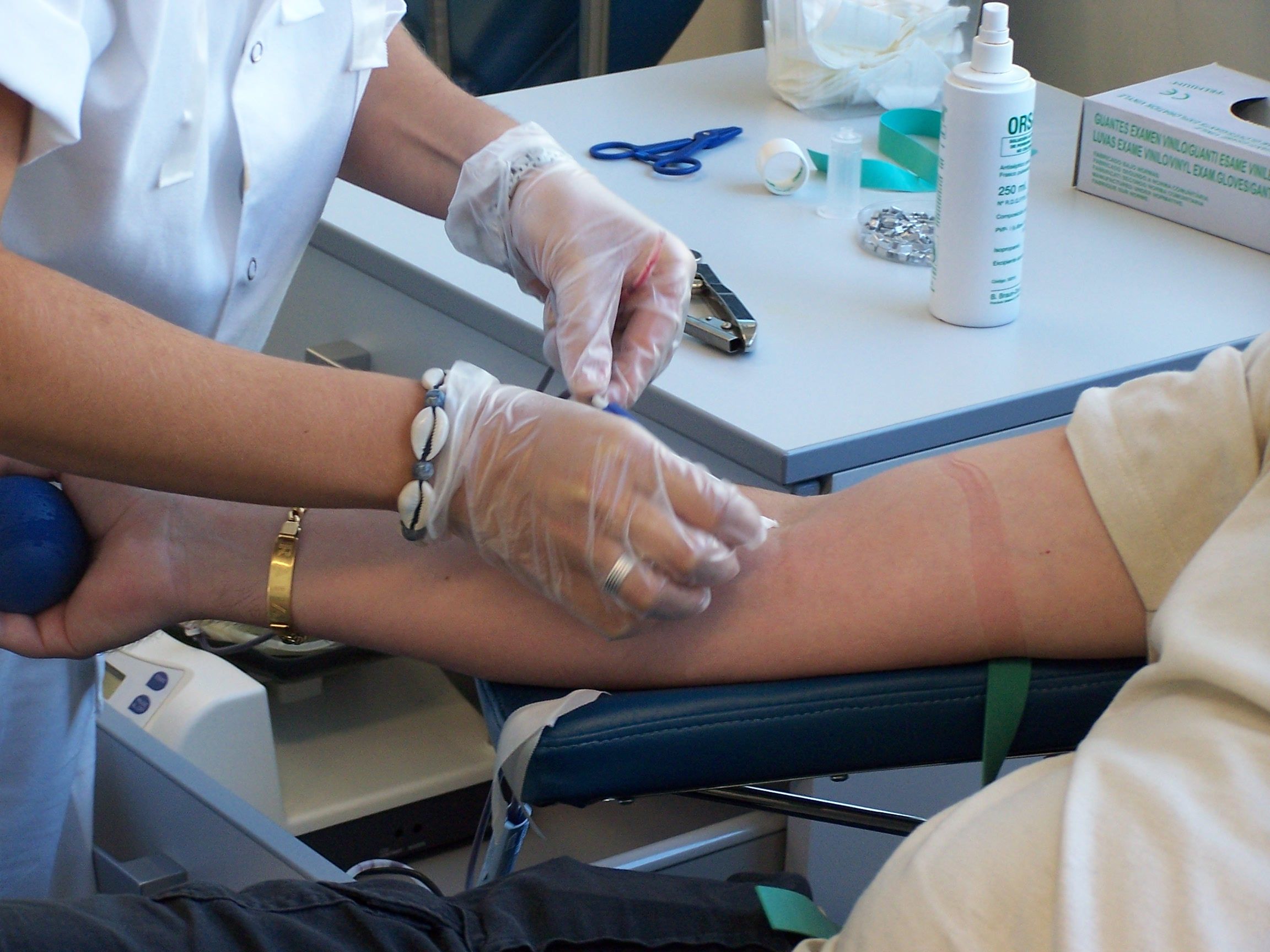
- La donación de una bolsa de sangre de 450 cc mediante punción es similar a la de un análisis.
- La extracción de tubos para análisis incluye: determinación del grupo sanguíneo, serología de SIDA, sífilis, hepatitis B, hepatitis C y recuento de células sanguíneas (hematíes, plaquetas y leucocitos).
- Para evitar la aparición de hematomas: ejercer presión durante unos minutos donde se ha extraido la sangre.
- Tras descansar entre 10 y 15 minutos y tomar un refrigerio, estará en condiciones de retornar a sus actividades habituales, aunque deberá evitar los esfuerzos intensos el resto del día.
- En las 2 horas posteriores a la donación se debe evitar:
- Consumir alcohol.
- Fumar.
- Exponerse a elevadas temperaturas.
- Conducir vehículos pesados.
- Realizar ejercicio intenso.
- Durante las 24 horas siguientes: ingerir abundante líquido.
Los resultados del análisis serán enviados al domicilio facilitado por el donante.
En el caso de ser la primera donación, recibirá además el carnet que le acredita como donante de sangre donde podrá anotar las posteriores donaciones.
Resuelve cualquier duda a través de:
- El equipo médico del punto de donación al que acudas.
- El perfil de twitter: @Madridonasangre.
- El teléfono gratuito: 900 30 35 30.
La donación de sangre paso a paso
La donación paso a paso
¿Quieres conocer cuáles son los requisitos para donar sangre? ¿Cuál es el procedimiento y los pasos que se siguen? ¿Quieres saber cómo te tratamos? ¿Y lo que se hace posteriormente con tu sangre? ¿Cuántos pacientes mejoran su salud gracias a tu generosidad?
En este vídeo te lo contamos.
Preguntas frecuentes
¿Qué hacemos con tu sangre?
Las donaciones de sangre recogidas en todos los hospitales públicos y unidades móviles llegan al Centro de Transfusión de la Comunidad de Madrid, donde son analizadas y sometidas a un proceso denominado fraccionamiento, mediante el cual, cada unidad de sangre se divide en sus 3 componentes: hematíes, plaquetas y plasma, que se transfundirán posteriormente hasta a 3 personas diferentes.
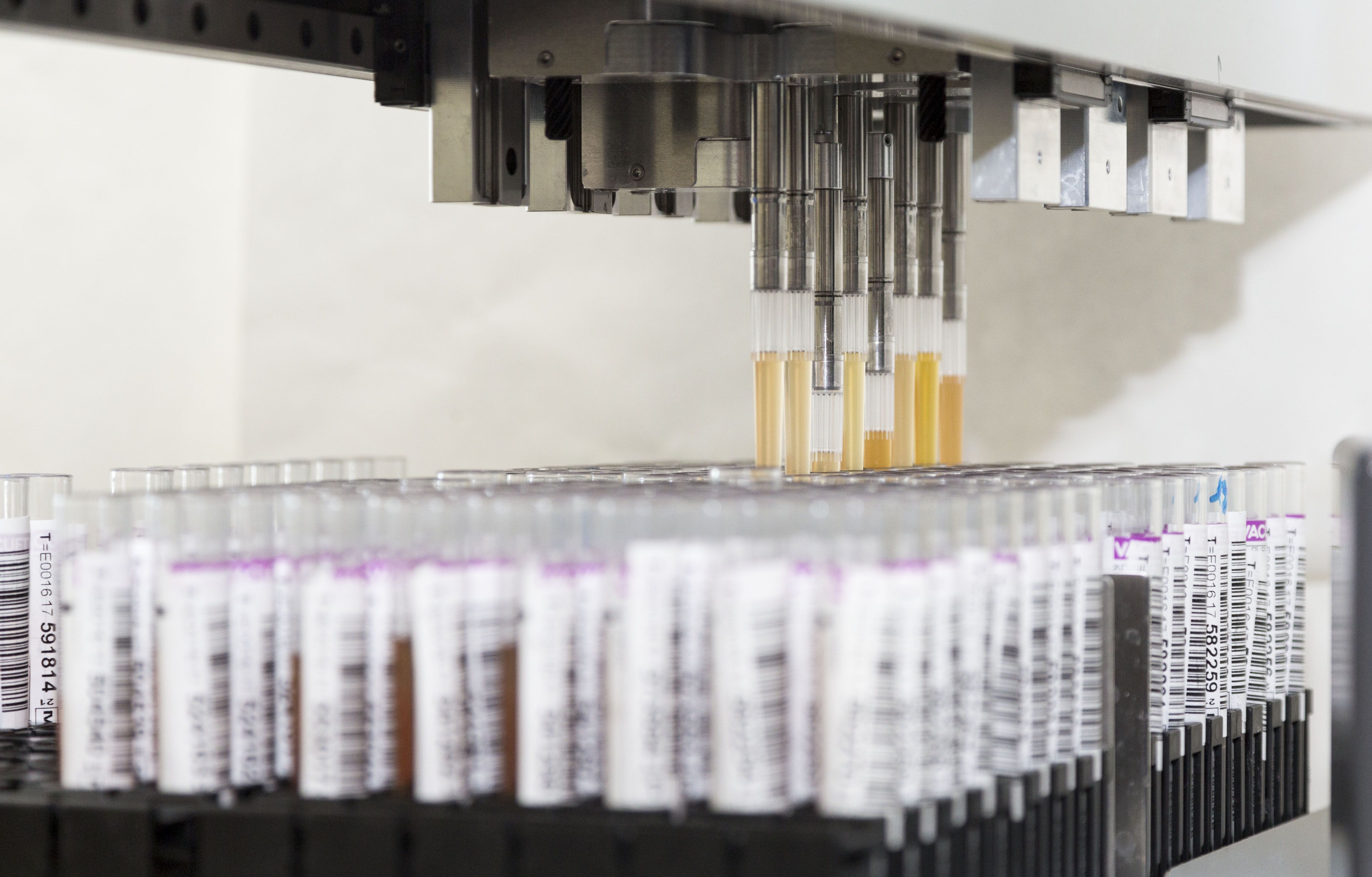 A todas las donaciones se les realizan los análisis que marca la normativa vigente: determinación del grupo sanguíneo y estudios serológicos para la detección del HIV, hepatitis B y C, test de sífilis y recuento hematológico, además de un screening para la detección de la enfermedad de Chagas, paludismo o HTLV en algunas donaciones.
A todas las donaciones se les realizan los análisis que marca la normativa vigente: determinación del grupo sanguíneo y estudios serológicos para la detección del HIV, hepatitis B y C, test de sífilis y recuento hematológico, además de un screening para la detección de la enfermedad de Chagas, paludismo o HTLV en algunas donaciones.
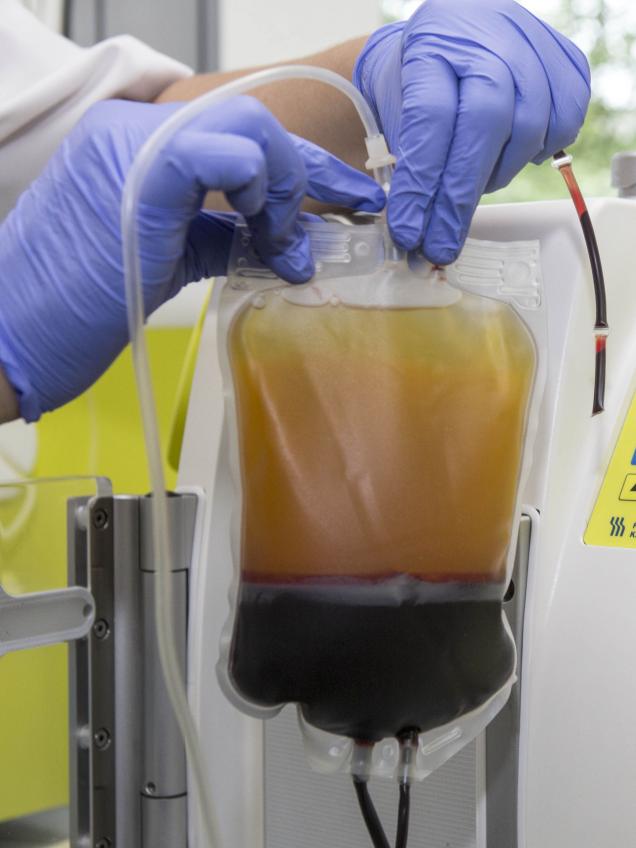 Las unidades de sangre donada se someten a un proceso de centrifugación para separar los tres componentes.
Las unidades de sangre donada se someten a un proceso de centrifugación para separar los tres componentes.
Una vez centrifugada la bolsa de sangre y mediante un sistema de prensas, cada componente se trasvasa a una bolsa diferente.
Posteriormente, se someten a procesos de filtrado e inactivación para aumentar su seguridad.
La siguie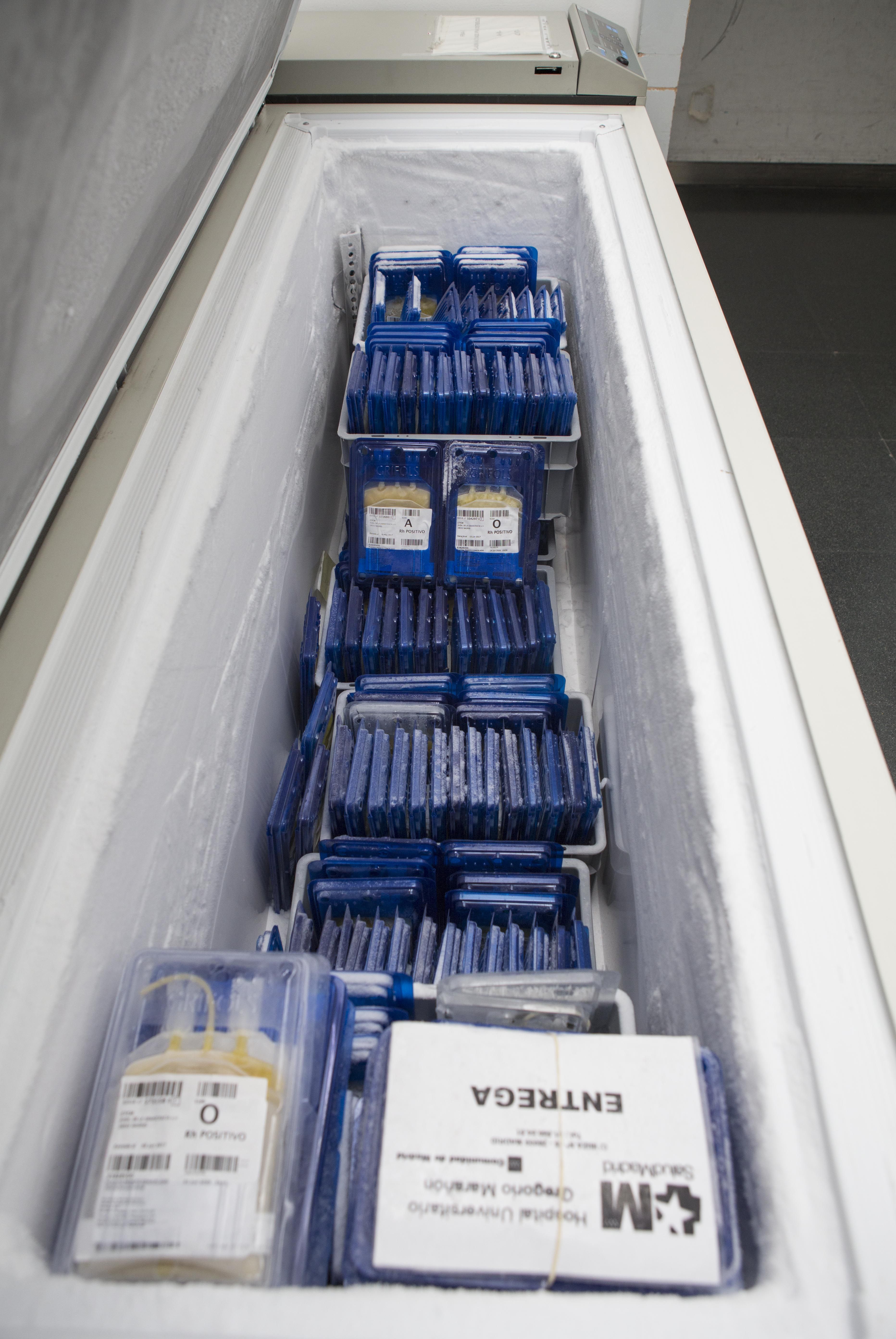 nte etapa es almacenar la sangre para poder distribuirla a los hospitales de la Comunidad de Madrid de acuerdo a sus demandas.
nte etapa es almacenar la sangre para poder distribuirla a los hospitales de la Comunidad de Madrid de acuerdo a sus demandas.
Puesto que la sangre es un tejido vivo, tiene un tiempo limitado de almacenamiento: los hematíes se mantienen durante 42 días a 4ºC; el plasma, puesto que no tiene células vivas, se puede congelar durante 3 años a -40ºC y, por último las plaquetas, que necesitan 22ºC, sólo duran 5 días.
La sangre representa 1/13 del peso total del cuerpo humano (5 litros en una persona de 65 Kg. de peso). Circula por las arterias y las venas, de color rojo vivo en aquellas, y color oscuro en éstas.
El 55% es un líquido llamado plasma, en el que están en suspensión diversas células: glóbulos rojos (43%), glóbulos blancos y plaquetas (2%). Por tanto, el 55% de la sangre es parte líquida y el 45% son partes sólidas.
Además hay una parte gaseosa (oxígeno, anhídrido carbónico, etc.).
 Plasma: es un líquido compuesto de agua, sales minerales y otras sustancias necesarias para el normal funcionamiento del organismo y en el que se encuentran suspendidas las células sanguíneas. Son de gran importancia entre esas sustancias las proteínas, las grasas y los hidratos de carbono, así como los factores de la coagulación, imprescindibles para evitar las hemorragias.
Plasma: es un líquido compuesto de agua, sales minerales y otras sustancias necesarias para el normal funcionamiento del organismo y en el que se encuentran suspendidas las células sanguíneas. Son de gran importancia entre esas sustancias las proteínas, las grasas y los hidratos de carbono, así como los factores de la coagulación, imprescindibles para evitar las hemorragias.-
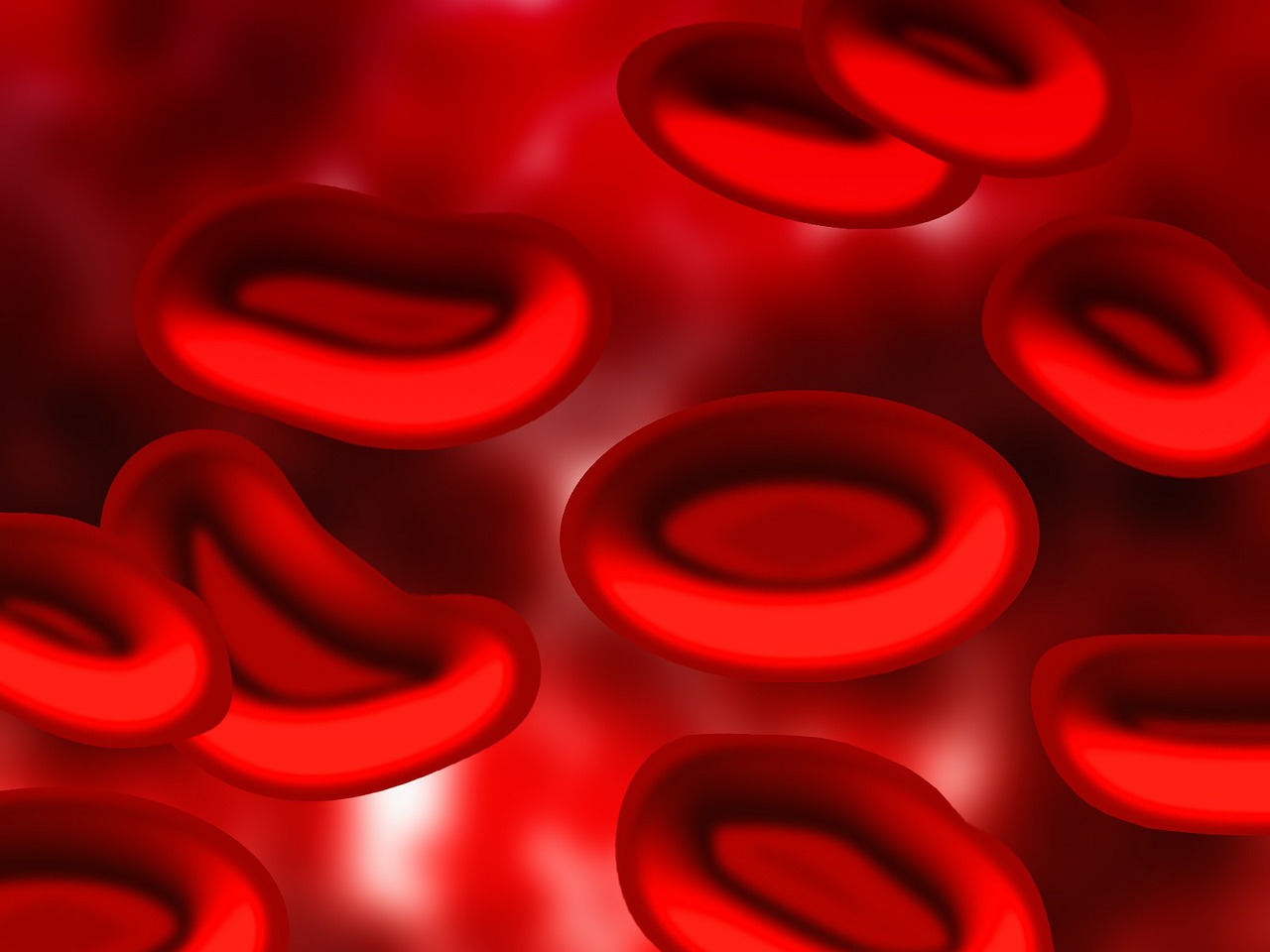 Glóbulos rojos o hematíes: son las células sanguíneas más numerosas, contienen la hemoglobina que es la responsable de su color rojo característico. Se forman en la médula ósea y transportan el oxígeno de los pulmones a los tejidos. Tienen una vida media de cuatro meses. Cada persona tiene entre 4.000.000 a 6.000.000 por milímetro cúbico. El exceso de glóbulos rojos se denomina eritrocitosis. El déficit de glóbulos rojos se denomina anemia.
Glóbulos rojos o hematíes: son las células sanguíneas más numerosas, contienen la hemoglobina que es la responsable de su color rojo característico. Se forman en la médula ósea y transportan el oxígeno de los pulmones a los tejidos. Tienen una vida media de cuatro meses. Cada persona tiene entre 4.000.000 a 6.000.000 por milímetro cúbico. El exceso de glóbulos rojos se denomina eritrocitosis. El déficit de glóbulos rojos se denomina anemia. -
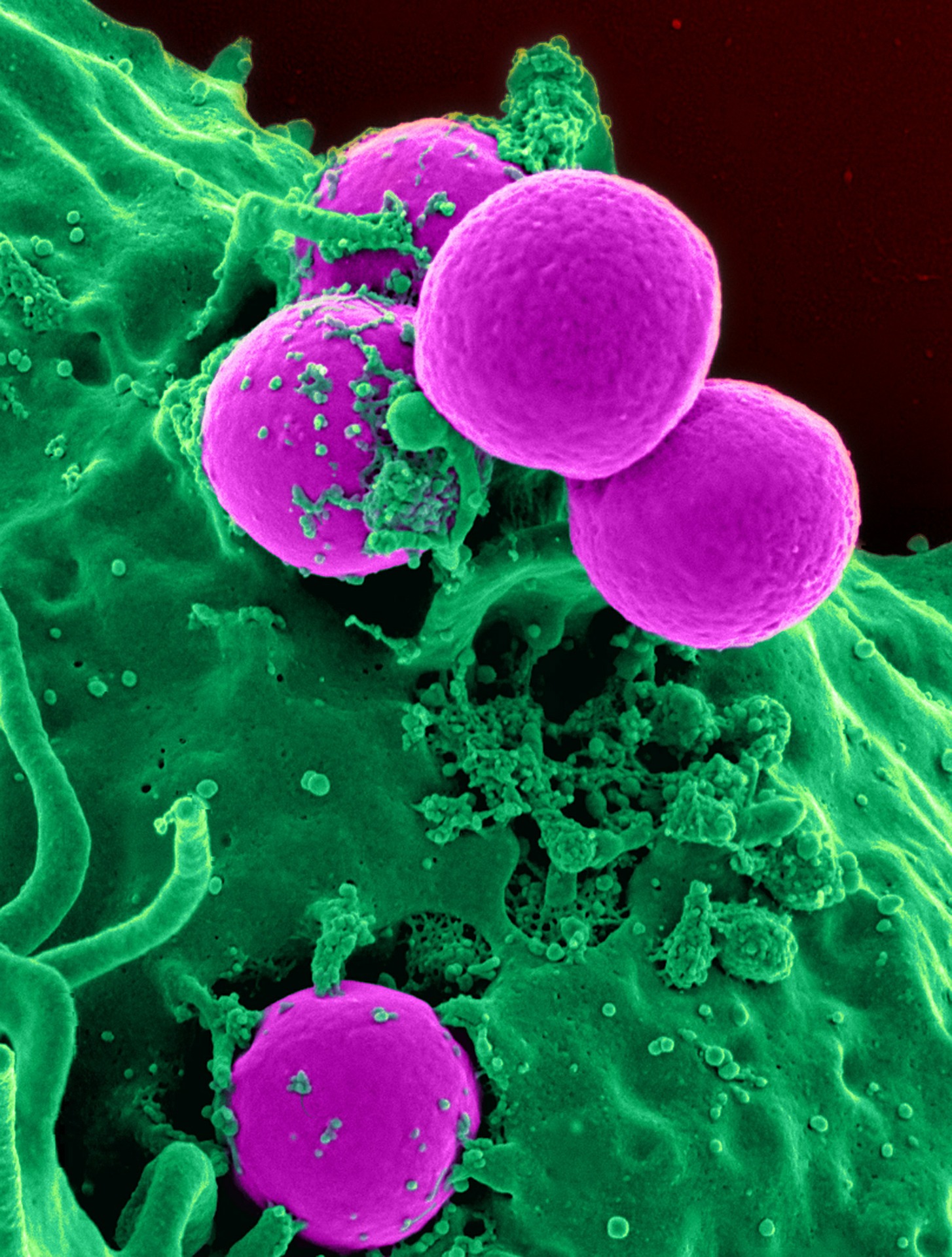 Glóbulos blancos: son menos numerosos que los glóbulos rojos. Son los encargados de proteger al organismo contra los diferentes microbios. Una persona tiene entre 4.000 y 10.000 leucocitos por milímetro cúbico. En caso de infección aumenta el número para mejorar las defensas. Tienen una vida muy corta, menos de 24 horas.
Glóbulos blancos: son menos numerosos que los glóbulos rojos. Son los encargados de proteger al organismo contra los diferentes microbios. Una persona tiene entre 4.000 y 10.000 leucocitos por milímetro cúbico. En caso de infección aumenta el número para mejorar las defensas. Tienen una vida muy corta, menos de 24 horas. -
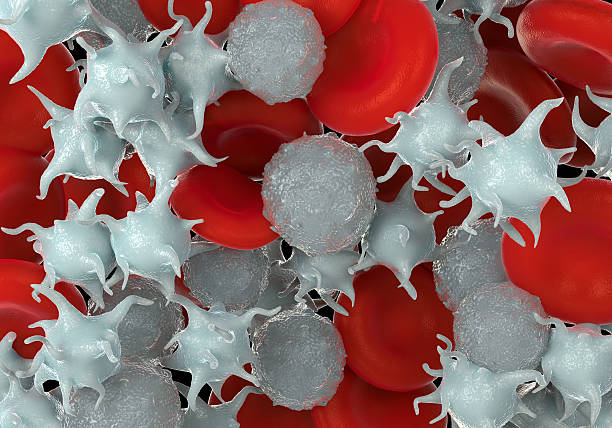 Plaquetas: son las células sanguíneas más pequeñas. Intervienen cuando se produce una ruptura de los vasos sanguíneos. Se adhieren rápidamente, formando un coágulo que para la hemorragia. Tenemos entre 150.000 y 400.000 por milímetro cúbico. Tienen una vida media de 5 a 7 días fuera de nuestro cuerpo.
Plaquetas: son las células sanguíneas más pequeñas. Intervienen cuando se produce una ruptura de los vasos sanguíneos. Se adhieren rápidamente, formando un coágulo que para la hemorragia. Tenemos entre 150.000 y 400.000 por milímetro cúbico. Tienen una vida media de 5 a 7 días fuera de nuestro cuerpo.
Las células sanguíneas se fabrican en la médula ósea que es el tejido esponjoso que se encuentra en el interior de los huesos.
Donación de plasma
Donación por aféresis
¿Qué es?
La extracción automatizada de sangre, o aféresis, es un tipo especial de donación que permite a una persona donar selectivamente una parte de los componentes sanguíneos, como glóbulos rojos, plaquetas o plasma.
La donación por aféresis más frecuente es la de plaquetas. Utilizando esta técnica, con una sola donación se obtiene una cantidad de plaquetas equivalente a la obtenida de cinco donaciones de sangre total. Además, al provenir de un sólo donante, se garantiza una mayor calidad y seguridad transfusional necesaria en determinados tipos de pacientes.
¿Para qué se usa?
Los derivados sanguíneos resultantes de la aféresis se destinan a pacientes con cáncer, leucemias, anemia aplásica, trasplantes de órganos y, frecuentemente a pacientes que reciben tratamiento con quimioterapia o radioterapia.
El cuerpo humano posee entre 150.000 y 400.000 plaquetas por mm3 de sangre. En las leucemias, cáncer, trasplantes, etc. la cifra de plaquetas baja de 5.000 por mm3 por lo que los enfermos necesitan muchas transfusiones de plaquetas para recuperar la cifra normal.
¿Cómo donar?
Se realiza mediante una máquina que está conectada en circuito cerrado con la vena del donante. El proceso es seguro ya que todo el material que se utiliza es estéril y de un sólo uso pero requiere un poco más de tiempo (unos 60 minutos). En el procedimiento, todos los componentes de la sangre, menos aquellos que se recogen en esa donación, regresan al donante.
Además de los requisitos para la donación de sangre convencional, es imprescindible no haber tomado ibuprofeno, paracetamol o aspirina ni productos que contengan ácido acetil salicílico durante los cinco días previos a la donación. En esta donación concreta, junto al cuestionario habitual de salud, hay que firmar un consentimiento informado.
¿Dónde donar?
En el Centro de Transfusión, ubicado en Valdebernardo. Por el tiempo que se emplea en dicha donación, se aconseja solicitar cita previa para la reserva de máquina de aféresis a través del teléfono 91 301 73 55 o bien en el correo donacion.aferesis@salud.madrid.org.
Debido a los medios que precisa la donación por aféresis, ésta no puede efectuarse en todos los puntos de donación de sangre convencional. Si se desea recibir información sobre otros centros hospitalarios donde se realiza, consultar en el teléfono 91301 72 00 ó en el gratuito 900 30 35 30.
¿Quieres ser donante de médula ósea?


Indica al personal que te atienda que ponga una pegatina indicativa en el cuestionario que rellenes para tu donación de sangre.
"El club de las cosas bonitas"
El Centro de Transfusión de la Comunidad de Madrid ha presentado una nueva campaña de donación de sangre, ‘El Club de las Cosas Bonitas’, con el objetivo de impulsar esta actividad entre el público general desde un enfoque positivo y vitalista. Bajo el lema ‘Cuando Donas Sangre, Pasan Cosas Bonitas’, la iniciativa, que ha arrancado el 24 de junio, coincidiendo con el mes del Día Mundial del Donante de Sangre, se centra en las consecuencias positivas del acto de donar sangre de una manera emocional y alegre. Una perspectiva innovadora que pone a las personas en el centro, a la vez que alimenta el sentimiento de pertenencia a ese 'Club de las Cosas Bonitas', que permite que podamos seguir disfrutando, persiguiendo y viviendo nuestros sueños.
Más información
Oficina de Atención al Donante de la Comunidad de Madrid:
- Teléfono: 913017249.
- Correo electrónico: atencion.donante@salud.madrid.org.



